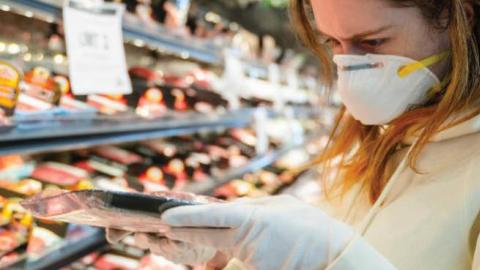As the Covid-19 pandemic appears to ebb in many areas of the world, governments, businesses and consumers are grappling with how quickly they can return to “normal.” I’m really hoping this doesn’t happen for the food industry.
The pandemic shocked the sector out of its long collective torpor around the healthiness of its products and their supply chains. To survive, food companies have been forced to innovate. The pandemic has cast an intense spotlight on both the heroic companies and on the short-sighted practices of others. Those conventions include crowded and unsafe meat packing plants and broken distribution systems that have kept food from reaching hungry people.
But Covid-19 has also forced food providers of all types, from multibillion-dollar suppliers to mom-and-pop restaurants, to rethink their business models. From a food consumption standpoint, the virus poses a bigger threat to those with obesity and diabetes and seniors than it does to many other population groups. That has given pause to age-old reliance on selling less healthy foods. From a food production standpoint, the pandemic poses threats to factory employees who must work side-by-side. And from a food distribution perspective, anyone who goes into a store to buy food must consider the risk of infection as well, however low that risk may be. Home delivery companies such as Instacart and Amazon have been flourishing on this fear.
In short, many food companies are rethinking what they sell, how they make it, and how they deliver it – all with the public good in mind. Some have changed their practices in all three areas, and in ways many did not think was possible before.
The takeaway: Food companies are capable of profound change if they have the will. If Big Food companies don’t learn this lesson – if they don’t vow to keep innovating and embedding social impact into their mission without the pandemic’s gun to their head — they may not succeed long term. Here’s why: The pandemic only accelerated trends well under way in consumer behavior. Those trends include a growing awareness of the link between food and health, a deep concern for the environment and a disdain for companies that don’t consider stakeholders beyond stockholders.
During the pandemic, the halos around the noblest food companies have only grown brighter. Chobani donated more than 3 million cups of yogurt to food banks around the U.S. and ramped up production to do so, buying more milk from dairy farmers hit hard by the decline in the restaurant business. The Norwich, N.Y.-based company will lower prices for the second half of the year so that more people who are out of work can afford its yogurt.
Unilever has donated more than 100 million Euros worth of soap, sanitizer, bleach and food to national health organizations and non-government bodies to distribute to communities in need. The company is also offering 500 million Euros in cash relief to suppliers and retail partners that are strapped by the pandemic. Texas-based grocery chain H-E-B – one of the first supermarket companies to implement safety measures and impose limits on shopper purchase quantities for some foods — is offering prepared foods from local restaurants in its stores and giving the restaurants all of the profits. Anheuser-Busch and Coca-Cola are making hand sanitizer and donating it to Covid-19 health care workers. Coke is also helping its restaurant industry partners by giving its own employees vouchers for takeout meals and donating to restaurant worker relief efforts.
But for other companies, the pandemic only made them look worse. Behemoth meat packers Smithfield, Tyson and JBS were hit hard by the coronavirus outbreaks, and drew comparisons to Upton Sinclair’s 1906 muckraking novel, “The Jungle,” because of their crowded factory floors and harsh working conditions that fueled the virus’ spread. In March, a South Dakota Smithfield plant reportedly became the nation’s largest cluster of Covid-19 cases, with 518 employees testing positive and in turn infecting 126 non-employees. Shutdowns and reduced operations at meatpackers resulting from Covid-19 outbreaks are causing shortages that will likely persist for a while.
Consumers are not likely to forget what certain companies did during the epidemic. The pandemic is turbo-charging an overall concern for health, economic inequality and the environment that was already in place. Here are some shifts in thinking that were pushed further as a result of the crisis:
Food and Health
More people around the world are thinking more carefully about the link between food and health. In a survey of consumers in 18 countries regarding their attitudes about food as a result of the pandemic, 73% said they are changing the way they eat to improve their health and immunity. An International Food Information Council (IFIC) survey of American consumers showed that more than half of Millennials, the largest generational cohort, prioritize health when choosing food. They will now be more deliberate about their food choices.
Income and Health Innequality
The pandemic has also laid bare the health gap between the haves and have-nots. The World Economic Forum recently pointed out the tragedies of food waste, food insecurity and food overconsumption. It urged food companies to rethink how they make and distribute their products. “We have a food-storage and distribution problem, alongside a systemic and growing gluttony problem, not just a production problem,” the WEF says. Among Millennials 83% state that businesses should be involved in societal issues.
Food and the Environment
According to IFIC, 59% of consumers say that the sustainability of foods is important. With disruptions in the food supply and evidence of lower pollution as a result of the coronavirus crisis, the food industry’s environmental impact will undergo even more scrutiny as its supply system contributes to 24% of all greenhouse gas emissions. Calls by the EAT-Lancet Commission will further exacerbate these pressures to change. They are calling for a 50% reduction in red meat consumption by 2050 to address climate change.
As shutdowns at meatpacking plants continue to add to shortages, companies like Beyond Meat are lowering their prices and serving up their plant-based meat alternatives in more consumer-friendly packages. According to a University of Michigan study commissioned by that company, a plant-based burger generates 90% less greenhouse gas emissions, requires 45% less energy, has 99% less impact on water scarcity, and 93% less impact on land use than a quarter pound of traditional U.S. beef. Since the pandemic closed or curtailed meatpacking operations and spurred meat shortages, sales of meat alternatives like Beyond Meat have nearly tripled, according to Nielsen sales tracking reports.
Food companies everywhere must recognize that their customers have changed. The companies that don’t incorporate social impact into their corporate missions will lose out. Some things they must do:
* Embrace purpose as the new profit. Companies that demonstrate social impact leadership and that imbue their employees with a sense of purpose are seeing that doing the right thing is good business. Consider that Unilever’s “Sustainable Living” brands grew 69% faster than its other businesses in 2018. Over the past few years, 85% of companies with a clearly articulated and understood purpose experienced positive sales increases, and 58% saw growth of at least 10%, according to a LinkedIn survey. And according to PwC’s Workforce of the Future survey, 88% of Millennials say they want to work for a company with a purpose.
* Meet consumer demands for healthier foods that are sustainable. The success of meat alternatives during the pandemic is likely to continue even when meat supplies return to normal. Newly aware of the impact that meat production has on the environment, consumers will likely keep buying plant sources of protein. Food companies must find a way to capture business from the growing number of these “flexitarians” and continue to add new products that promote better health.
* Fix your own house. Consumers are not likely to forget the images of cramped meat production lines, exhausted supermarket workers and overworked Amazon warehouse employees. Social media will help them remember. Demonstrating care for your employees during both good and bad times will help consumers want to buy more of your products.
Over the next few months, as the U.S. and other parts of the world cautiously re-open, leaders of food companies making products that impair our health must examine their consciences. Their innovative responses to the pandemic prove they are capable of making rapid, big and beneficial-to-society changes.
Read in Forbes



















